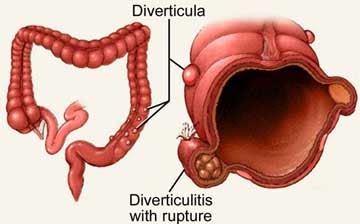Diverticulitis is becoming increasingly common in the Western world, mainly because of diet. So if it’s directly connected to our diet, the important question is: can a plant-based diet help diverticulitis?
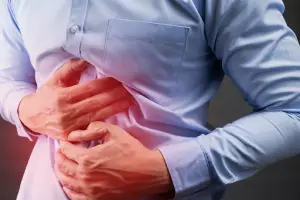
A century ago, this disease did not even exist. However, it’s now so prevalent that almost half the adult population above 60 is estimated to have it, according to Harvard Medical School. This goes to show that the traditional western diet is increasing the prevalence of this disease.
Scientific research indicates that a plant-based diet is good for preventing diverticulitis. But it may also be good for treating the condition, albeit with a few tweaks and restrictions. Diverticulitis can get very serious, very fast, so it’s something to watch out for as you age.
What is Diverticulitis?
Is diverticulitis a disease? Is diverticulitis an infection? Diverticulitis is a disease where pouches (diverticula) form in the colon, and they get inflamed or infected. It’s part of the diverticular diseases that affect the digestive tract.
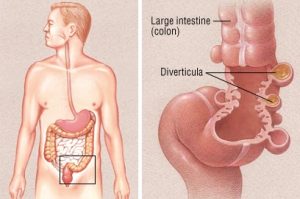
Diverticulitis is the most serious form of diverticular diseases and may have serious complications if left untreated. What happens is that weak parts of your intestine, typically in the lower-left side, form pouches like balloons inflating outward. These pouches get infected or cause inflammation around the intestine.
Diverticulitis Symptoms
Diverticulitis symptoms can be mild or severe, depending, of course, on the severity of the condition. Sometimes they can occur very suddenly. Here are the common signs of diverticulitis:
- Abdominal pain
- Nausea and vomiting
- Fever
- Blood in stool
- Rectal bleeding
Some other common diverticular symptoms may also appear when you have diverticulitis. These include diarrhea, bloating, or constipation. In other words, if you consistently see any of those symptoms, you should see a doctor for a diverticular diagnosis.
Abdominal pain is the most common symptom, and it can range anywhere from mild to severely painful. Typically, the pain is on the left side, but some people report pain on the right side as well. The more of the above symptoms you experience, the more serious your condition is.
What are Diverticulitis Risk Factors?
There are no particular known causes of diverticulitis, but doctors have narrowed down some risk factors.
Age: As you age, the risk of diverticulitis may increase. Is diverticulitis common among old people? This condition is significantly common amongst people over 50, which indicates that it may be related to age as well, in addition to some environmental factors.
That said, younger people who have another diverticular disease are also at the risk of developing diverticulitis.
Non-fiber Diet: A deficiency of fiber in the diet has been associated with a high risk of diverticulitis. This may explain why it’s becoming so prevalent in the US, given that the average American is consuming less than half the recommended daily intake of fiber.
Obesity: Although there’s no conclusive evidence yet, obesity is generally considered a risk factor for diverticulitis. There are two inferences behind this: obese individuals don’t consume much fiber, and they lack healthy gut bacteria. Some studies have confirmed the relation between the two.
Physical Inactivity: Being physically inactive may also increase the risk of diverticulitis, among other gut-related diseases.
Vitamin D Deficiency: According to one study, higher levels of Vitamin D can prevent diverticulitis. Similarly, its lack thereof can increase the risk.
Family History: Family history may also play a part in increasing the risk of diverticular diseases, including diverticulitis. This means that diverticulitis could be hereditary as well.
Diverticulosis vs. Diverticulitis
Often people confuse diverticulosis with diverticulitis as they are similar-sounding names. When the pouches in the colon are not inflamed or infected, the disease is termed diverticulosis.
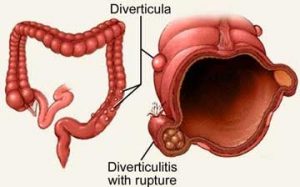
Diverticulosis is far less serious than diverticulitis, and may not even show any symptoms. Often diverticulosis may get cured on its own, while in some cases through medication.
According to a study, 10 to 25 percent of patients with diverticulosis can develop diverticulitis. So if you develop the former, it’s important to watch out for the latter, as it’s much more serious and unpleasant.
How is Diverticulitis Diagnosed?
Diverticulitis is diagnosed through a series of tests. The first step is a physical examination where the doctor may look for tenderness in and around your abdomen. They might also perform a digital rectal exam.
Since symptoms of diverticulitis are similar to other gut-related diseases, your doctor may prescribe multiple tests. This may include blood tests, stool tests, urine tests, abdominal ultrasound, abdominal x-ray, and in some cases, abdominal CT scan, and abdominal MRI.
Can a Plant-based Diet Help Diverticulitis?
Let’s talk about prevention first, as a plant-based diet is extremely important for avoiding diverticular diseases, including diverticulitis. There is quite a lot of evidence that suggests that those who don’t get enough fiber are at risk of this condition. It’s also clear that a plant-based diet, rich in fiber, may prevent gut-related conditions.
Fiber Prevents Diverticulitis
There have been studies that refute the fact that a low-fiber diet causes diverticulitis. In this video, Dr. Michael Greger discusses the studies and refutes their outcome. He also cites some African studies that show that fiber, indeed, is extremely important for preventing diverticulosis, and ultimately, diverticulitis.
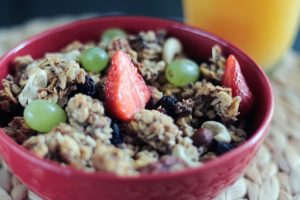
This article, over at Dr. T Colin Campbell’s Center for Nutrition Studies, also emphasizes the importance of a whole-food plant-based diet for both prevention and treatment of diverticulitis. They have cited multiple studies that have shown that high amounts of fiber prevent diverticular diseases.
There’s no surprise that this is the case as fiber is immensely important for gut health. It promotes a healthy gut microbiome that prevents many of the common gut-related diseases, including Crohn’s disease, IBS, and diverticular diseases.
However, this particular also emphasizes that fiber can help with the treatment of diverticulitis, which is contrary to the common practice of avoiding fiber when diagnosed with diverticulitis. If diverticulitis is not severe, fiber may help treat it. Although when it’s really severe, most doctors recommend avoiding fiber until the disease has reduced or reversed. That’s not to say that fiber is bad for you, but that your digestive tract needs some rest.
In a large cohort study from Britain, data from 700,000 women was studied. The study found that just increasing 5 grams of fiber each day resulted in a reduction of 15 percent in the risk of diverticulitis.
Another research study, published in Advanced Research in Gastroenterology and Hepatology, also concluded that a plant-based diet significantly reduces the risk of diverticulitis. So it’s safe to say that as far as prevention is concerned, a plant-based diet is the safest option.
Anti-inflammatory Effect
It’s important to note that diverticulitis emerges as a result of inflammation or infection in the balloon-like pouches that form on the walls of the large intestine. This disease only becomes serious because of the very inflammation or infection. As the inflammation gets severe, so does the risk of serious complications.

Since diverticulitis is relatively new and didn’t even exist in the 20th century, there’s still a need for research, especially into the inflammatory effects of the disease. As this paper discusses, inflammation plays an important role in acute diverticulitis, so for the treatment, there’s more research needed regarding the inflammation.
We already know that a plant-based diet has anti-inflammatory effects. It’s one of the best diets for treating arthritis, which is a disease marked by inflammation in the joints. There’s a lot of scientific evidence that proves the anti-inflammatory nature of plants.
Therefore, a plant-based diet can help in treating diverticulitis. In the most severe cases the anti-inflammatory effects are the biggest advantages.
What Foods to Avoid If You Have Diverticulitis?
Prevention is a different story, and treatment is a completely different story. The very thing that protects you from the disease, fiber, is to be avoided if you have a severe case of diverticulitis. Yes, fiber is really good in general, and in specific, for preventing diverticular disease. You may want to moderate fiber intake in the most severe cases until your gut has had a chance to heal.
Diverticulitis causes inflammation in the colon. Fiber is hard to digest. It may further upset the colon. Doctors usually recommend staying off fiber until the inflammation has gone, which could take some time.
Dr. Campbell argues that fiber could help in the treatment as well, which makes sense for diverticulosis, as it’s less severe. Fiber can gradually improve the digestive system and promote a healthy gut microbiome, eventually ending the diverticula in the digestive tract.
On the other hand, those with a severe form of diverticulitis should stay off fiber as recommended by their doctor. Your doctor is the best judge for your dietary changes in this situation.
Liquid Diet
When the inflammation or infection gets really bad, most doctors prescribe a liquid diet to their patients. This allows the digestive tract to rest and fix itself. You may also need to take antibiotics to treat the infection.
In this condition, meat and animal products are strictly off-limits because they can exacerbate the inflammation. On the other hand, plant-based foods (except for high-fiber ones) may be highly beneficial for reducing inflammation.
Even if you’re on a liquid diet, you may want to stick to plant-based liquids, including soups, fruit juices, broth, and tea. You should work out with your doctor to find what exactly you can eat or drink.
Some believe nuts and seeds are bad for diverticulitis patients. However, research has shown that this is not the case and many doctors have reversed on this front. So you can consume nuts and seeds, preferably ones that have anti-inflammatory effects.
Is Diverticulitis Curable?
According to a publication in the Canadian Journal of Epidemiology, over 75 percent of diverticulitis cases are not complicated and can be treated easily. Early detection is key to a good prognosis.
If it’s not severe, it may get cured simply by avoiding high-fiber foods, letting the digestive system rest, and through medication. However, in some cases, certain complications can occur. Some of the diverticulitis complications include:
- Intestinal obstruction
- Intestinal perforation
- Abscess
- Fistula
- Phlegmon
These complications may require hospitalization because the symptoms become unbearable. Sometimes, these symptoms require surgery, where the doctor may remove the infected part of the intestine.
To avoid such complications, it’s important to consult with a doctor as soon as you experience the symptoms. It’s also necessary to manage the symptoms and stick to the changes prescribed by the doctor. In most instances, you should be able to cure diverticulitis by making necessary lifestyle changes.
It’s important to note that to avoid the recurrence of diverticular diseases, which is very much a possibility, you should stick to a high-fiber plant-based diet. Most doctors advise their patients to keep eating fiber to prevent another case of diverticulitis in their lifetime.
Is diverticulitis fatal? Diverticulitis may lead to complications and require surgery, but it’s not fatal in most cases. However, it can lead to peritonitis, which can be fatal. Diverticulitis patients may also develop other more life-threatening diseases, even when diverticulitis is uncomplicated.
Can diverticulitis cause cancer? It does not directly cause cancer but if the disease is severe, it can increase the risk of colorectal cancer. So even though diverticulitis itself may not be life-threatening, it paves the way for other life-threatening conditions.
Wrap Up
Can a plant-based diet help diverticulitis? Yes, it’s good for both the prevention and treatment of the disease. Fiber is highly important when it comes to avoiding all diverticular diseases. It’s all the more important for people in their middle age and old age, as they are more at risk.
If you’ve been diagnosed with diverticulitis, your first order of business is to prevent it from getting worse. Avoid putting stress on your digestive tract and stick to healthy plant-based liquids.
Switching to a plant-based diet gradually resolves all your gut-related issues. In just weeks, it will balance the bacteria in the gut and promote better digestive health. Even if you’re young and not particularly at risk, going vegetarian will likely prevent any diverticular disease in the future.

